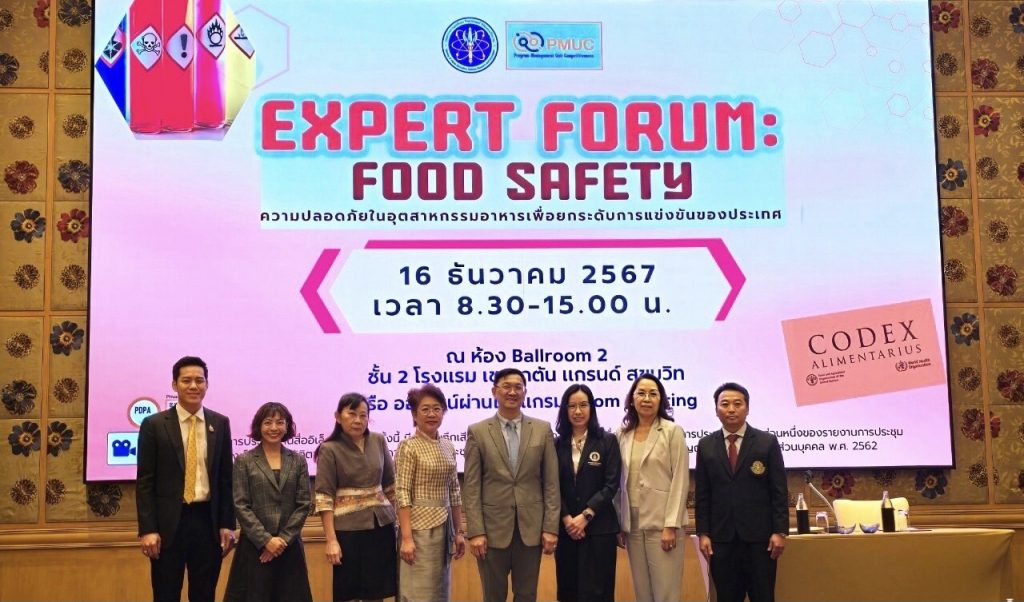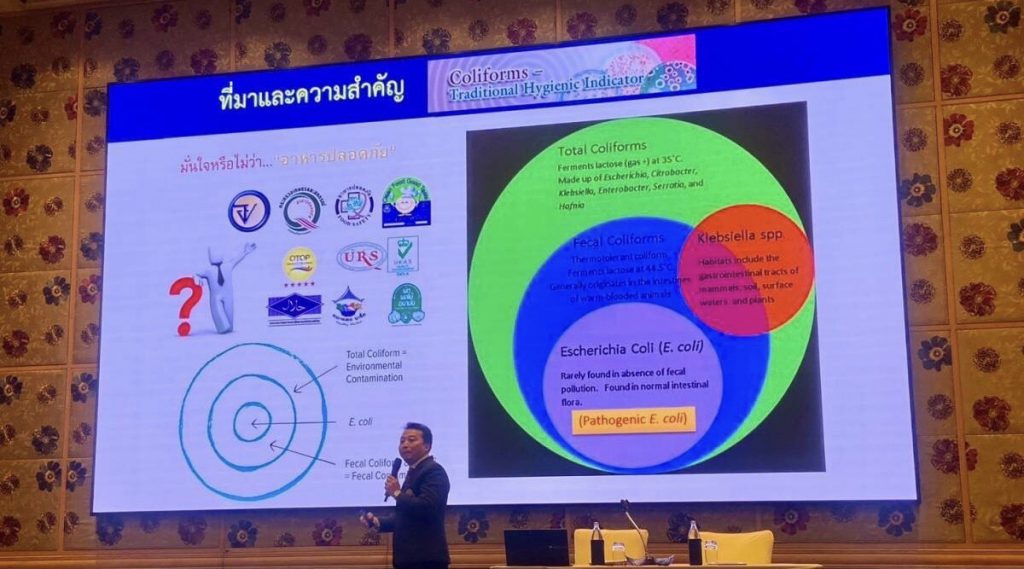Thai-SMEs

The Program Management Unit Competitiveness (PMUC), under the High-Value Food Program of the Ministry of Higher Education, Science, Research, and Innovation (MHESI), hosted the “Expert Forum: Food Safety in the Food Industry to Enhance National Competitiveness.” The event aimed to set research directions, gather insights from experts and stakeholders, and establish research agendas on food safety to bolster Thailand’s food industry competitiveness.
PMUC Director Assoc. Prof. Dr. Thongchai Suwonsichon emphasized that the PMUC’s mission is to enhance Thailand’s competitiveness, focusing on eight target industries, including food. By leveraging research, technology, and innovation, the goal is to transform the food sector into a high-value industry. A core focus lies in developing processes and certifications aligned with international standards to improve food quality and safety, enabling research commercialization.
Assoc. Prof. Dr. Warapa Mahakarnchanakul, Director of the Research and Development Institute at Kasetsart University and an expert in food safety, highlighted the importance of food safety in today’s food industry. Consumer concerns include contamination from microorganisms and chemicals, food adulteration, improper additives, mislabeling, and genetically modified organisms (GMOs). Key global factors affecting food safety include climate change, water use and reuse, heightened environmental awareness, food adulteration, food security, and shifting consumer behavior.

The industry must adapt to these challenges by addressing climate change’s impact on pathogen growth and spread, implementing effective risk assessment and reduction strategies, and reducing food waste. Regarding water management, the focus should be on water reuse and recycling technologies and ensuring water quality through treatment and monitoring. The circular economy encourages sustainable practices, including plastic waste management, which requires robust risk assessments to avoid unintended hazards. Additionally, food adulteration and security necessitate traceability systems and effective communication of risks to consumers.
Changing consumer behavior also drives demand for personalized nutrition, plant-based and insect-derived proteins, and low-chemical natural foods. The industry should integrate advanced food safety measures and innovative ingredient analyses.
Dr. Sakranmanee Krajangwong, Senior Veterinarian at the National Bureau of Agricultural Commodity and Food Standards (ACFS), discussed international food safety standards under Codex/WHO. Codex serves as a WTO reference standard, balancing consumer health and trade facilitation. Global food safety networks, such as INFOSAN and WOAH, emphasize a farm-to-table approach to contamination prevention.
She noted the growing adoption of the “One Health” approach, emphasizing integrated efforts across humans, animals, plants, and ecosystems to enhance food safety. Thailand should leverage this approach for research integration, fostering advanced lab testing methods that meet international standards and promoting commercialization of research outputs to reduce production costs and encourage innovation.
Key Research Highlights:
1. Sulfite Sniffer V2023: A rapid sulfite residue detection sensor for frozen seafood, developed by Assoc. Prof. Dr. Kanchana Uraisin from Mahidol University. This innovation uses vapor-based technology, delivering results within three minutes, eliminating complex extraction steps, and extending usability with a shelf-life of at least one year. It represents a leap forward for Thailand’s frozen food industry.
2. COLI-2-in-1 Test Kit: Developed by Assoc. Prof. Dr. Anusak Kerdsin from Kasetsart University, this test kit detects coliforms and fecal coliforms in food, water, and surfaces. To achieve commercial success, further quality assessments under ISO 16140-2:2016 and independent certification are needed.
Prof. Dr. Nathdanai Harnkarnsujarit, Manager of the High-Value Food Research Coordination Office under PMUC, summarized the key strategies for promoting and advancing research to enhance food safety in the industry, as discussed by speakers and participants during the forum.
Recommendations from the Forum:
• Support research on quality and real-time analysis technologies.
• Develop tools for detecting contaminants like toxins, allergens, and pathogens.
• Establish scientifically backed positive lists and national strategic product criteria.
• Promote integration of research through the One Health Approach, linking data to national food safety standards.
• Encourage commercialization of research to reduce costs and drive innovation.
By fostering collaboration among agencies and stakeholders, Thailand can advance its food safety standards, enabling industries to compete globally while ensuring consumer trust and environmental sustainability.
#PMUC #FoodIndustry #FoodSafetyStandards #ThaiSMEs